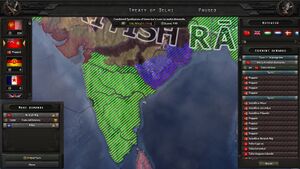A peace conference allows the victors of a war to make lasting changes to the status of the losing countries, such as annexing them or liberating new nations from their territory.
触发
和平会议是由一个处于战争中的国家失去过多的胜利点而触发的,一旦到达了指定的投降界限,其国家就会被迫停止抵抗。如果是一个阵营的国家同时处于战争状态,那么只有所有参战的国家投降了才能触发和平会议。
当然战争不利一方也可以提出和谈。 在这种情况下,占优势一方可能会拒绝提出和谈的决议,如果这样,那战争依旧会继续。
Setup
In the case of unconditional surrender, the peace conference is created between the country that was forced to surrender (recipient) and the enemy that has the highest war participation against it (actor). The countries participating on the winning side are determined as follows:
- any country that is at war with the recipient and is not at war with the actor
- if any two of those countries are at war with each other
- remove the non-faction member if exactly one of them is in the same faction as the actor
- remove both otherwise
- remove any countries that are more than 50% occupied by non-allied winners of the war (e.g. in a historical outcome Poland does not take part as a winner because they are occupied by the Soviet Union)
The losing side contains all countries that
- fulfill the conditions for surrender above
- are at war with all winners
- at peace with the recipient
- have at least some war participation dealt against them
- or were removed from the winning side due to being occupied
分数
每一个在战争中获胜的国家得到的分数相当于他们对在战争中为击败敌国所奉献的代价。战胜国可以在和平会议中利用这些分数,依次提出其要求。每当一个战胜国在属于它的谈判回合中跳过,它在跳过后所获得的分数等于它在它会议开始时分数的20%。
Turns
The country with the highest score gets to make demands first. From then on the turn passes to whichever other country has the highest remaining score. This means that lower scoring countries may never get their turn if higher scoring countries pass frequently or have enough score from the beginning to take everything. Once a country has made a demand it can not be disputed within the conference.
Depending on their country specific rules, countries can pick from a range of options:
- taking territory
- changing ideology
- puppeting
- liberating new countries (potentially as puppets)
- transferring their remaining score (when a different winner is selected)
- passing their turn (increasing their score by +20% of the initial value)
- ending their demands entirely, distributing their remaining score among allies
A country can also make demands on behalf of another winner (by selecting their flag on the left) but still needs to spend its own score for it. Actions taken will cost different amounts of points and cause world tension depending on relevant war goals, ideologies and territorial claims.
A country can only spend 30% of its current score each turn or the difference to the second highest scoring country, whichever is higher.
AI
AI国家的行为很大程度上取决于它们的意识形态。
民主主义
民主主义国家十分倾向于解放国家,尤其是被解放国也是民主主义的。它们倾向于把非民主主义国家政府改组成民主主义的,并且基本不获取领土,除非它们对特定的领土有宣称。民主主义国家不能在和平会议中傀儡他国,但可以释放傀儡。
共产主义
共产主义国家倾向于傀儡降国,避开海外区域。
法西斯主义
法西斯主义国家倾向于吞并,但也会在其他大陆上建立傀儡政权。
中立主义
中立主义国家倾向于保持沉默,大多只会吞并有核心的领土。
判决
When all winners are done making demands and, in the case of conditional surrender, the loser accepts, the selected changes get implemented. The winners stop being at war with the losers, ownership and control of states change according to the demands. World tension gets reduced by a fraction of what the war initially caused but this is usually offset by demands that cause new tension.
